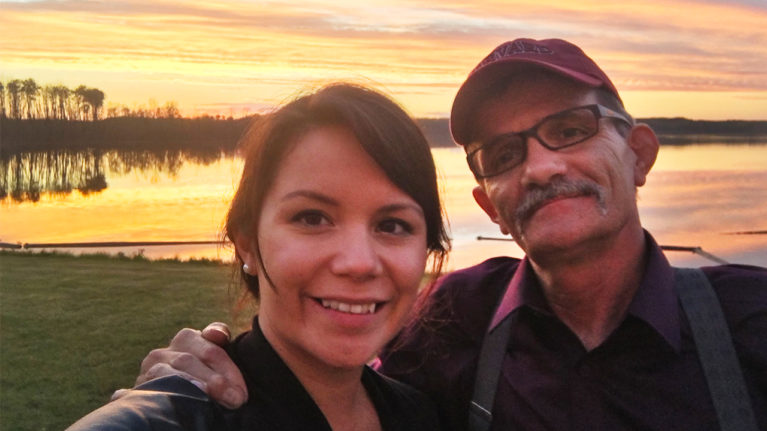How can I offer a child a love that I’ve never received? Friends assure me becoming a mom is an instinct, but that feels too simple.

The author and her father. Photo: Courtesy of Gabrielle Scrimshaw
Growing up, Mother’s Day was an annual reminder my classmates’ families had a member that my family didn’t. In grade two, a substitute teacher instructed our class to make cards out of colourful construction paper. When I asked who to make my card for, she realized I didn’t have a mom at home, and gave me a familiar “bless your heart” gaze. She suggested I make it for an important mother-like figure—“Your grandma perhaps?” This was the usual solution, rotating my school-mandated Mother’s Day craft between my grandma and my dad.
I do have a mother, but I don’t have a mom. As with many families, our situation is complicated. If people ask, I tell them my mother has struggled with demons throughout her life, but I don’t offer details. As a residential school survivor, her story is heartbreaking, but it’s also not my story to tell. My story, however, is one of always wondering what it would feel like to have a strong mother-daughter bond. As I entered adulthood, it became about questioning if I have what it takes to become a good mom myself.
As a child I’d see my mother once a year. We’d meet at the worn-down playground in my small Saskatchewan town, population 800. Later on, my dad would drive me to Prince Albert to spend an afternoon with her. On a good year, we’d see a movie or go out for dinner. On a bad year, my dad would pick me up early, and I would cry silently in the passenger seat on the way home. He’d hold my hand, uncertain what to say. My dad became a single parent in his late twenties, tasked with raising three daughters on an artist’s budget. At every step of our childhood, he tried to fill the shoes of two parents—providing for us, caring for us, disciplining and nurturing us—summoning a strength I’ve always admired.
Still, there were small things about my friends’ families that exposed the gap in mine. In high school, their moms would take them shopping, while I was dropped off at the mall. When we went away to university, their moms sent them care packages and called almost daily. I bought my own necessities, and talked to my dad every couple of weeks.
It’s hard to explain the feeling of missing something you’ve never had. Sometimes, I imagine an alternate universe where my mother and I have a close relationship. Somewhere else, there’s a version of me whose mom taught her how to cook, cried with her after her first big breakup or calls every day just to check in. In my reality, the visits between my mother and I grew less frequent as the years went on. The last time I saw her was seven years ago. There was a smile, an awkward hug, and small talk to fill the space between us. Today, we live thousands of miles apart and know very little about one another.
For years, I convinced myself I was okay with this arrangement. Then I got engaged and began to discuss the future with my partner. Suddenly the hole in my heart became impossible to deny. I’m sad about all the things I missed out on. And I’m scared for what type of parent I might become.
Friends assure me becoming a mom is an instinct, but that feels too simple. Can I really offer a child a mom’s love, not knowing what it feels like to receive it? My partner says I’m overthinking it. “If you care this much about getting it right,” he’ll say, “I know you’re going to make a great mom.” While I am less certain than he is, his confidence gives me hope. Maybe all I can do is forge forward, like my dad did three decades ago, offering my family the best I can.
When I’m brave, I close my eyes and imagine another universe, one full of sleepless nights and playdates. If I get really carried away, I see a fridge covered with hand scribbled-cards. One of which reached a surprise recipient for Mother’s Day–me.
FILED UNDER: first person Mother’s Day Motherhood Parenting
Source link : https://www.todaysparent.com/family/family-life/can-i-be-a-good-mom












